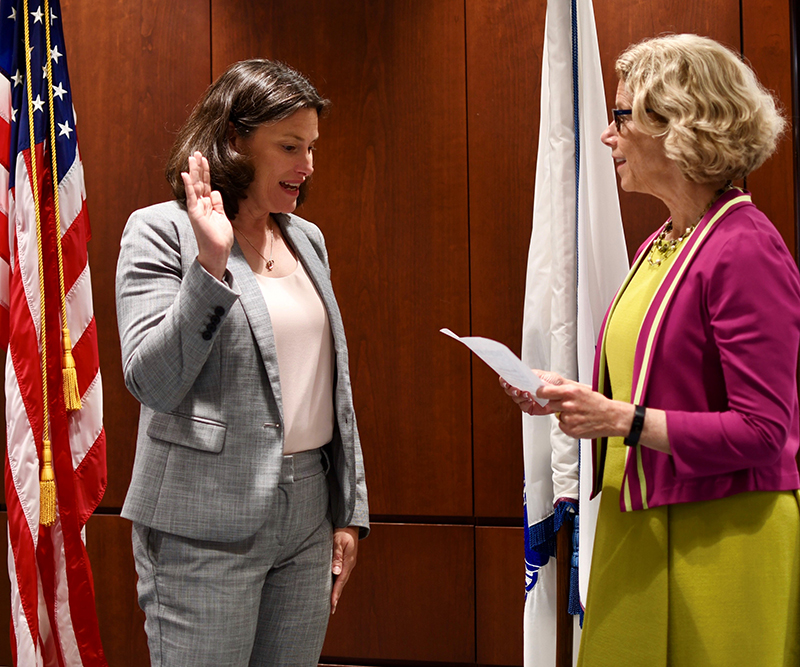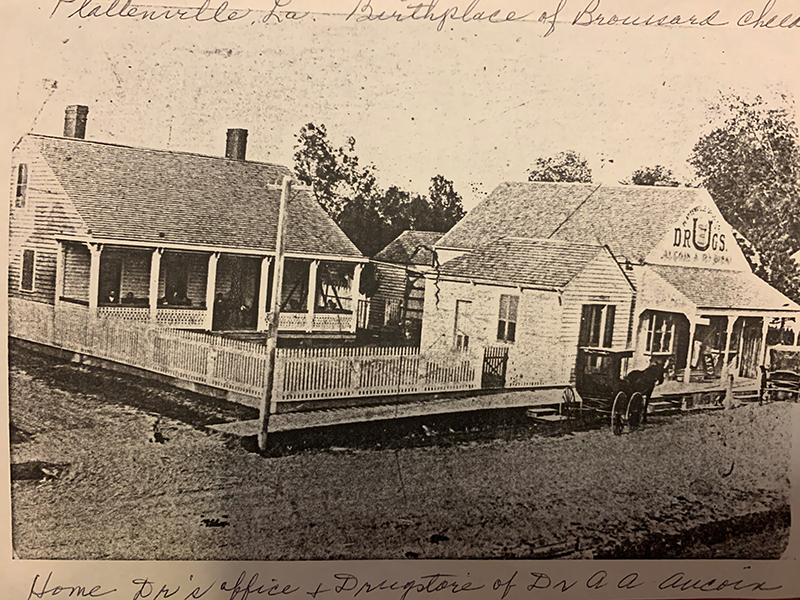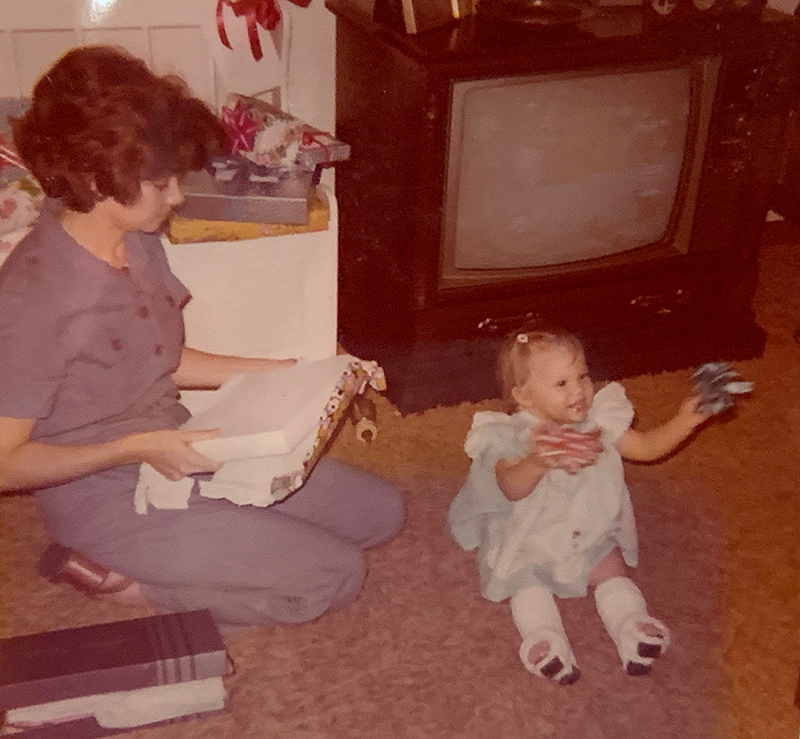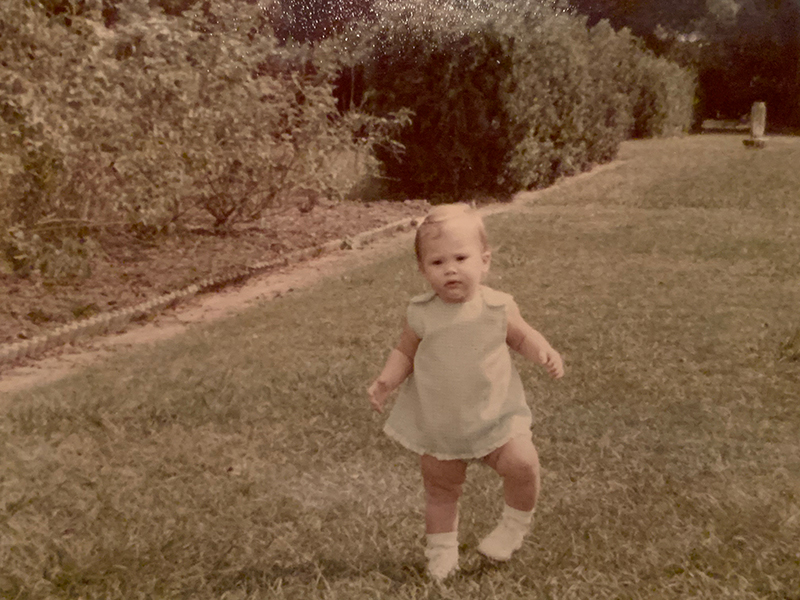
Credit: NICHD/NIH
Confronting a pandemic runs in the family for NICHD Deputy Director Alison Cernich, Ph.D.
Dr. Cernich’s great-great maternal grandfather Adolphus A. Aucoin, M.D., was a doctor in New Orleans during the cholera pandemic of 1880. As one of the few practicing physicians in Assumption Parish during the early 1900s, he was also the pharmacist, the postmaster, and the coroner. His children helped to run a drug store and post office beside his doctor’s office.
“He did it all,” Dr. Cernich said. “Essentially, he was the mayor of Plattenville, Louisiana.”

Credit: Alison Cernich, Ph.D.
For Dr. Cernich, six months into her new leadership position as NICHD Deputy Director, the coronavirus pandemic upended the nation, sending all non-essential U.S. workers to telework for more than a year. She immediately became immersed in health and safety issues, like personal protective equipment, staff density, and virus exposure.
But as the months stretched to a year, Dr. Cernich was the voice of a balanced perspective: keeping work, family, and home life in check. She modified her own expectations as the pandemic continued into 2021.
“My goal is to get to tomorrow,” she said. “The challenge is to find balance and not lose sight of our mission while we respond to a pandemic. What’s been stunning to me and what has kept me motivated is our team,” she said. “I’ve learned a lot about flexibility and resilience and how well this organization runs. It is encouraging.”
Resilient Roots

Credit: Alison Cernich, Ph.D.
Dr. Cernich learned from a young age that resilience and persistence pay off. Born bowlegged, she began walking with her legs in casts and then had braces on both legs until age 5. She wore corrective shoes until high school and orthotics inside her shoes, which she continues to use. But as a toddler, she said, her mother marveled at how she adjusted with ease. “My mother says I stumbled for a bit and then just powered through and was fine,” she said. “It didn’t seem to bother me.”

Credit: Alison Cernich, Ph.D.
Growing up, she was surrounded by disability and determination.
Her family dates back more than a century in New Orleans to both the Cajuns, French descendants on her mother’s side, and Greek descendants on her father’s side. Family, particularly her grandparents, played a pivotal role in her upbringing. Her maternal grandparents, John Douroux, Sr., and Aline Douroux, taught her to read by the age of 3, taking her to the local New Orleans library nearly every day and reading her articles from the daily newspaper.
Her paternal grandmother, Lorraine Nenos, and her maternal grandmother, Aline Douroux, suffered strokes. Helping to care for her grandmothers, including living with her maternal grandmother during her rehabilitation, gave Dr. Cernich a personal perspective of the debilitating effects of the condition.
Her step-grandfather, Al Kennedy, was a double above-the-knee amputee, an injury he suffered from his service in the Battle of the Bulge during World War II. He was a lineman for an electric power company and continued his work despite the injury. He built his own hydraulic lift so he could do repairs at home, paint, re-shingle, change the oil on his car, and he was also an incredible wheelchair dancer. Watching him gave Dr. Cernich the perspective that individuals with disability can adapt and engage with family and community in creative ways.
“Because I was surrounded by disability growing up, it was just a way of life, part of the environment,” Dr. Cernich said. She had relatives and friends with physical and developmental disabilities. Her great grandmother was blind and Dr. Cernich became accustomed to having her feel her face to say ‘hello.’ They had a close family friend with Down syndrome who was part of her and her husband’s life. “These were all people with whom we interacted regularly, it never seemed unusual.”
Disability a Way of Life
Making sure that people with disabilities are integrated into the wider community and receive the services they need became her mission and motivation. Before taking the leadership role as NICHD Deputy Director in September 2019, Dr. Cernich led NICHD’s National Center for Medical Rehabilitation Research (NCMRR), overseeing a $72 million research portfolio aimed at improving the health and wellbeing of people with disabilities.
“When she was the Center director, she would walk into every room and say, ‘how are we considering the inclusion of people with disabilities,’” said Theresa Cruz, Ph.D., who replaced Dr. Cernich as NCMRR Director. She never assumed that this population was excluded intentionally, Cruz said, but made sure accessibility was accommodated. “Normalizing disability is something that motivates her.”
At NCMRR, Dr. Cernich led the development of the congressionally mandated NIH Rehabilitation Plan in 2016 (PDF 443 KB), an effort that required coordination with 17 NIH institutes and centers, as well as outreach to the disability community and several professional organizations. The five-year plan established priorities to guide NIH support for rehabilitation medicine and to benefit people with temporary or chronic limitations in physical, cognitive, or sensory function.
In 2018, Dr. Cernich collaborated with the U.S. Centers for Disease Control and Prevention to establish the collection of information from women with disabilities who give birth in the United States. NCMRR provided $1.5 million to the CDC to incorporate a disability supplement as part of CDC’s Pregnancy Risk Assessment Monitoring System (PRAMS), a survey administered by state health departments. The survey covers approximately 83 percent of U.S. births and includes attitudes and experiences before, during, and after pregnancy. Before this initiative, little was known about the estimated 1 million women of childbearing age in the United States who have a disability, as well as their risks or basic experiences during or after pregnancy. She also actively publishes on pregnancy and disability with recent articles documenting the research gaps in this area.
In 2019, Dr. Cernich was instrumental in the revision of NICHD’s Strategic Plan, an effort to identify scientific themes, goals, and opportunities to guide its research over the next five years. She has represented NICHD on large trans-NIH initiatives, including the All of Us Program and the HEAL (Helping to End Addiction Long-termSM) Initiative.
Her natural charisma and leadership skills helped NICHD launch the first NIH Instagram live video , where she highlighted NCMRR grantees and their pioneering work in the field of prosthetics.
Career Path into Science
A board-certified neuropsychologist, Dr. Cernich first became interested in the field as a teenager after watching the iconic horror movie “Silence of the Lambs.” Convinced she wanted to follow movie star Jodie Foster’s footsteps tracking down serial killers for the Federal Bureau of Investigation, she first took a psychology class in high school. While at Loyola University in New Orleans, one of her first mentors, the late Janet R. Matthews, Ph.D., encouraged her to pursue a practicum during her senior year. It was during this practicum at the Touro Hospital Subacute Rehabilitation Unit that Dr. Cernich found her calling. On her first day observing patients, Dr. Cernich met a patient who had suffered a traumatic brain injury. He couldn’t recognize his wife but knew his dog’s name. He could not name a key and a pen but could show how each was used. The experience convinced Dr. Cernich that she wanted to pursue a career in neuropsychology.
“I never looked back,” Dr. Cernich said. “That the brain could work in that way was incredible. I wanted to treat people with brain injuries, and it was going to be amazing.”
Her clinical work in graduate school at a community-based treatment program for people with traumatic brain injury informed her research. Many of her clients were individuals who either had an injury resulting from substance use or struggled with substance or alcohol use after their injury. Dr. Cernich and colleagues developed a treatment program tailored to the cognitive needs of the community. Her dissertation examined whether substance or alcohol use impacted outcomes and recovery from brain injury. She analyzed data from the Northern New Jersey Traumatic Brain Injury Model System, which she accessed during her pre-doctoral fellowship at Kessler Institute for Rehabilitation.
In 2001, Dr. Cernich completed her pre-doctoral internship at the U.S. Department of Veterans Affairs Medical Center in Baltimore. During her internship, she was introduced to computerized cognitive assessment systems in the early years of the technology. A post-doctoral fellowship at the National Rehabilitation Hospital in Washington, D.C., and the Baltimore VA Medical Center continued to sharpen her expertise in cognitive neuroscience and computerized testing. During her fellowship, she utilized computerized neuropsychological tests to assess concussion in military academy boxing programs, paratrooper concussion surveillance programs, and in a high school surveillance program in Fairfax County, Virginia. She also became intrigued with the technical limitations of computerized neuropsychological testing, publishing one of the first articles that considered the errors introduced by the computer system as a methodological issue in the use of these tests.
Family First
While completing her advanced degrees, Dr. Cernich married her childhood sweetheart, Scott Cernich. The two had known each other since growing up in New Orleans. In May 1999, they married in the chapel at her alma mater, Loyola University New Orleans. After giving birth to their first daughter in 2004, Dr. Cernich decided to stay home full-time, which she did for the first year.
In 2005, she was recruited for a potential position to assist with neuropsychological assessments of service members injured during Operation Enduring Freedom and Operation Iraqi Freedom. After learning more about the opportunity, she felt she was not emotionally ready for this work. Instead, she took a position with the VA Maryland Health Care System (VAMHCS) as a clinical neuropsychologist and attending for the Dementia Clinic. She began to build her independent research career, building a dataset related to work in the Dementia Clinic, expanding the Neuropsychology Service’s work with the Depleted Uranium Follow-up Program, and pursued and received a VA Career Development Award focused on the impact of aerobic exercise on cognitive function in people with chronic stroke.
As she was building programs to expand the work on exercise and cognition into other conditions, such as Parkinson’s disease, the VA health care system started to see more individuals who were severely injured from the Global War on Terrorism. She was one of the few clinicians with experience in TBI and rehabilitation at VAMHCS. She soon was managing a Polytrauma Clinic Support Team and providing leadership for a newly funded post-doctoral fellowship in post-traumatic stress disorder and traumatic brain injury.
After giving birth to her second daughter in 2009, Dr. Cernich began to take on many more leadership roles at the Department of Veterans Affairs.
Seeds to Success
Terry Lee-Wilk, Ph.D., was a staff neuropsychologist when Dr. Cernich was Director of Neuropsychology during her tenure at VAMHCS. When Dr. Cernich moved on, Dr. Lee-Wilk became Director and credits Dr. Cernich for planting the seeds for the program’s successful growth. The program has since expanded significantly in both size and focus.
“She was a real leader for neuropsychology and laid the foundation for a lot of different opportunities that were to come in the future,” said Dr. Lee-Wilk. Dr. Cernich built collaborative relationships with the wider medical and mental health staff. “Dr. Cernich made the connections and alliances, which were very helpful. She had a vision of what neuropsychology could be and she went after it versus keeping the status quo. It was refreshing.”
Moira Dux, Ph.D., was supervised by Dr. Cernich at the VAMHCS during her internship and a portion of her fellowship and appreciated her collaborative style that fostered innovative thinking. They shared an interest in rehabilitation research and the potential for exercise interventions to benefit cognition and daily function in people with neurologic disability. Dr. Cernich demonstrated how to balance a leadership role while continuing to engage in clinical and research pursuits. Now, a decade later, Dr. Dux is Director of the Psychology Training Program at VAMHCS.
Both Dr. Lee-Wilk and Dr. Dux emphasized Dr. Cernich’s ability to ensure her credentialed staff had equal footing in the wider organization, regardless of gender, age, or demographic characteristics.
“She really helped us have a seat at the table,” said Dr. Lee-Wilk. “Including across clinical, research, administrative, training, and leadership realms,” Dr. Dux added.
Rapid Rise to Leadership
Patricia A. Dorn, Ph.D., Director of the Rehabilitation Research and Development Service within the Department of Veterans Affairs knew Dr. Cernich from her research as a career development awardee in the VA. She watched her quickly rise within the ranks of both the VA and the Department of Defense.
“She has had a lot of accomplishments,” Dr. Dorn said. “She is able to synthesize a lot of information and detail yet see a broader perspective.”
From 2012 to 2015, Dr. Cernich was Deputy Director for the Defense Centers of Excellence for Psychological Health and Traumatic Brain Injury at the United States Department of Defense. The Centers help improve the lives of service members, families, and veterans through traumatic brain injury prevention and care. In her role as Deputy Director, Dr. Cernich was the senior liaison from the Department of Veterans Affairs to the Department of Defense on matters relating to psychological health and traumatic brain injury.
“Having a position that involves being a liaison between the VA and DoD is really very intense, demanding work,” Dr. Dorn said. “Every job has its complexities, but her job had complexities on multiple levels. She really did it well.”
Dr. Dorn recommended the NCMRR position to Dr. Cernich, suggesting she might want the change from DoD and VA policy to scientific research at NIH. “Dr. Cernich brings experience, knowledge, and ideas for advancing the field of rehabilitation medicine – but equally important is her modest demeanor and collaborative style,” Dr. Dorn said.
“She’s confident, she’s knowledgeable, but she’s not arrogant.”
Another colleague at the Defense Centers of Excellence first met Dr. Cernich at a DoD meeting and was immediately struck by her passion and people skills.
“We were seated next to each other and within moments I felt as though we had known each other forever,” said Billie J. Randolph, PT, Ph.D. Dr. Randolph works with the Department of Veterans Affairs and said she has continued to work with Dr. Cernich at NIH on various projects. “She has the ability to connect with people at all levels. She’s not just interested in the researchers, she connects with the people impacted by research, with the clinicians and the caregivers.”
“Her driving motivation is to improve the overall health and quality of life of the people she serves,” Dr. Randolph said. “She has a tenacity and determination that defines her leadership. People want to work with Alison Cernich because she makes us all better.”
Mentoring and Volunteering
Dr. Cruz credits her own career advancement in part to Dr. Cernich’s guidance and advocacy. Dr. Cruz completed a research experience at the Clinical Center at NIH, gaining experience with novel technologies. One of the best lessons Dr. Cruz said she learned from her predecessor is that while the science and research are important and key priorities, “leadership is about people. How you interact and get the best out of people.”
Despite the demands of her leadership position, Dr. Cernich carves out time to volunteer with her family. She is actively involved in the Greater DC Diaper Bank, a nonprofit that provides diapers to partner organizations that then distribute them as an incentive to access social services. Her family has increased their volunteer time packing diapers during the pandemic.
Dr. Cernich also volunteers as a coach for the Capitol Hill Little League, which offers kids with physical, developmental, cognitive disabilities, or social needs an opportunity to play baseball and softball. The kids with disabilities are paired with kids without disabilities as buddies who help each play and enjoy the game.
“My job as a coach is to teach these kids to work together, see how we can help each other, to bat, to throw, to get around the bases.”
Challenges Ahead
The past year was a whirlwind with NICHD leadership quickly responding to initiate research examining the pandemic’s impact on vulnerable populations. Dr. Cernich stepped into the role as Deputy Director before the pandemic.
“I had no idea what I was getting into,” she said. “I’ve joked with people that I wanted a leadership challenge, and it certainly has been a challenge.”
Perseverance and a positive perspective have buoyed her, keeping the focus on NICHD’s bold mission.
“We need to make sure we are paying attention to women, especially pregnant women, postpartum women, and children,” Dr. Cernich said. “Not just for signs that they have COVID-19, but the overall impact of the pandemic. People with disabilities are affected by disproportionate numbers, especially people with intellectual disabilities. We need to make sure this is our focus.”
Dr. Dorn has no doubt this focus will be front and center for Dr. Cernich.
“She’s not in it for herself,” Dr. Dorn said. “She’s driven by mission and what she can accomplish for those who benefit.”

 BACK TO TOP
BACK TO TOP